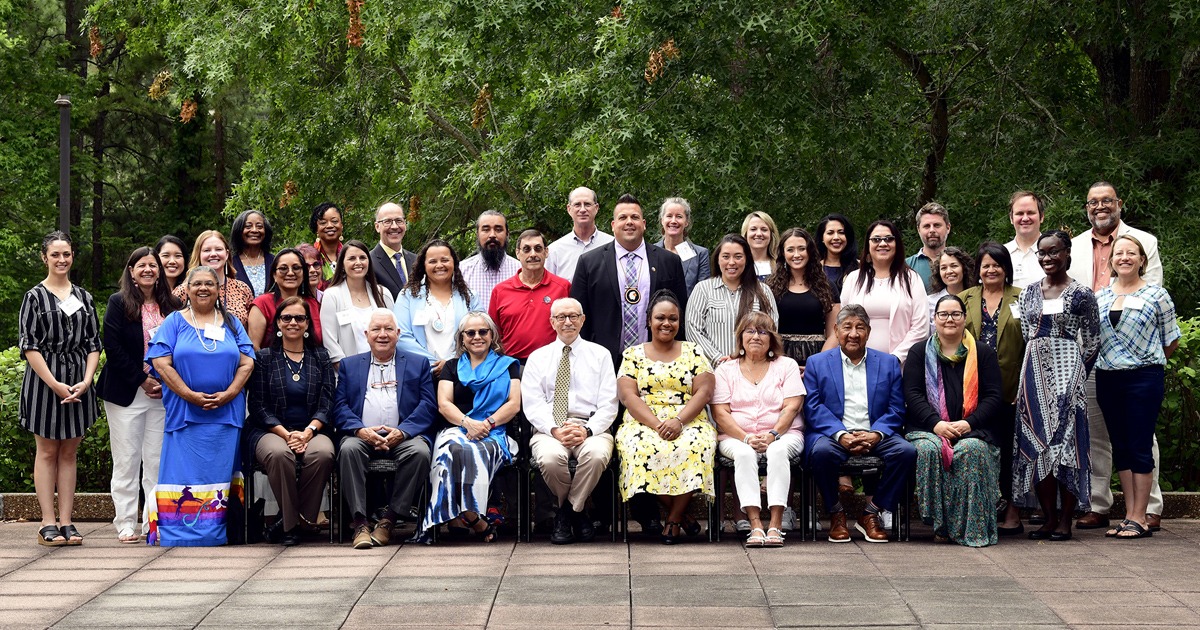On June 26-28, NIEHS welcomed the National Institutes of Health (NIH) Tribal Advisory Committee (TAC) to the institute’s Research Triangle Park campus and hosted the committee’s biannual meeting. The event provided a forum for the committee to learn about NIEHS-supported programs that work with Tribal communities on local environmental health questions and concerns. TAC is an advisory committee to NIH leadership. The meeting was coordinated by the NIH Tribal Health Research Office (THRO).
THRO is the central point of contact at NIH for federally recognized American Indian and Alaska Native (AI/AN) Tribes throughout the U.S. The office serves as the coordination hub for all Tribal health research activities at NIH. This involves coordinating collaboration across NIH institutes and centers as well as other agencies in the U.S. Department of Health and Human Services. The goals are to promote opportunities for the next generation of AI/AN scientists, expand health research with Native communities, and lead Tribal consultation and engagement efforts for NIH.
“That means making sure NIH is responsive to the needs of the communities, and also that Tribal communities are aware of what the scientists are doing,” said event host and THRO Director Karina Walters, Ph.D., who is a member of the Choctaw Nation of Oklahoma.
“It was important to share information about the various ways NIEHS is supporting research projects — many of which are community-engaged — to address Tribal environmental health issues across the country,” said NIEHS health specialist Liam O’Fallon, who helped plan the meeting. “Even still, there is room for improvement. The TAC appreciated hearing from us, and I hope we can continue to talk about our efforts and how we can take our work to the next level.”
Improving environmental health

The meeting included presentations by NIEHS scientists and grantees describing research and programs to improve the health of AI/AN populations. Speakers covered efforts related to environmental justice, women’s health, data science, environmental health disparities, worker training, community engagement, climate change, the Superfund Research Program (SRP), and water and soil contamination.
“In Indian country we say, ‘I am the land, the land is me,’” Walters explained. “If our rivers aren’t healthy or if our land is not healthy, then we are not healthy as human beings. Environmental health is critical to us.”
Walters said that because of the significant impact of climate change on Native communities, TAC Tribal leaders plan to work more closely with NIEHS to provide guidance on developing culturally appropriate climate change strategies and sharing perspectives on AI/AN initiatives.
In addition, TAC members sought to learn about the institute’s AI/AN research efforts, as well as scientific training and workforce development opportunities for Tribal communities. Walters said she was inspired to see how much of the institute’s work has direct relevance to Native communities.
“NIEHS has an excellent track record in Indian country, particularly with communities like the Navajo and research related to uranium mining, as well as important studies in the Great Lakes region, Alaska, and elsewhere,” Walters said.
Indigenous data sovereignty
Because Tribes are sovereign nations, they have the right to self-govern and protect the interests of the Tribe and its citizens, including areas involving research and data collection, ownership, and usage. During the meeting, Tribal leaders from the TAC discussed NIH Indigenous data sovereignty policy in development, and there was a related listening session with the TAC Tribal leaders and their technical advisors.
“Tribes have inherent rights of data ownership and stewardship on Tribal lands or with Tribal populations, or if there are direct implications for the well-being of Tribal nations,” Walters said. “In terms of NIH, our policy on Indigenous data sovereignty must be responsive to Executive Order 14112.”
That executive order, which was issued last year, supports Tribal self-determination and governance and calls on federal agencies to create initiatives to promote that goal. Data sovereignty is directly mentioned in the executive order.
“As an information security professional, the topic of data sovereignty is dear to me,” said attendee Ashley Lomboy, who is program director of Waccamaw Siouan STEM Studio.
NIEHS researchers and grantees like Lomboy also shared additional highlights from the meeting (see sidebar).

(John Yewell is a contract writer for the NIEHS Office of Communications and Public Liaison.)
Source link
factor.niehs.nih.gov

